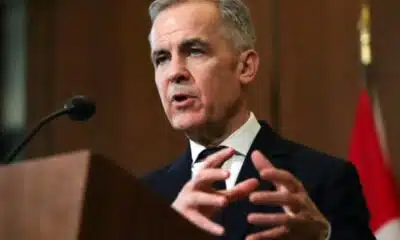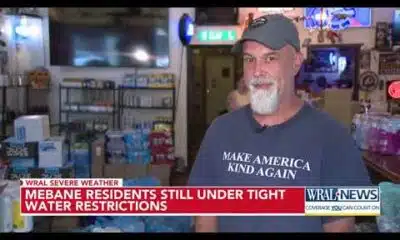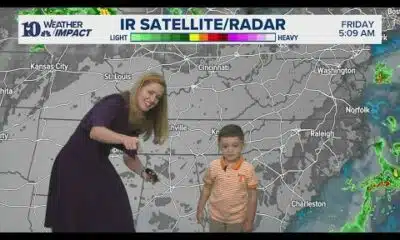News from the South - Virginia News Feed
A year after opening, controversial Norfolk brewery closes
A year after opening, controversial Norfolk brewery closes
by Jim Morrison, Virginia Mercury
March 10, 2025
When Norfolk’s City Council approved the permit for the controversial Armed Forces Brewing Company over some neighborhood objections, several members said let the marketplace decide its fate.
It didn’t take long.
A year after opening its doors, Armed Forces is closing, after a raucous launch when hundreds of community members opposed what they said was a divisive business whose marketing glorified violence, threatened LGBTQ people and said those with different views don’t love America.
A military-themed brewery sparks a fight in a Virginia military city
Early Thursday afternoon, Nicole Couch, the taproom manager, got a call from Alan Beal, the company’s chief executive officer, with the news employees had been expecting. The company had been bleeding red ink for years. A reconfigured board had met that morning and told Beal to “lock it up” and close the Norfolk facility after only 13 months.
Couch, a local beer industry veteran who had worked to revitalize what she called grim taproom attendance after being hired in June, realized she couldn’t tell her staff the news by text. She sent an emergency message saying the taproom would not open that day. Minutes later, they agreed to meet at Smartmouth Brewing in Norfolk that night.
There, she told them they had lost their jobs. She’d hoped Beal would issue an official statement after their phone call, as he’d told her he would in 30 minutes. He didn’t. Employees discovered the news and his statement by checking Facebook during the meeting. They were appalled that Beal was blaming Norfolk residents for the failure.
“There was no thank you (to the staff). It was all woe is me,” she said.
“Our ability to profitably operate in Norfolk was severely affected by the local woke mob – a few individuals in the area who have no love for the traditional American values we hold as a company,” Beal wrote, concluding that the taproom and brewery would go up for sale. “These people spread outright lies about our company, our employees and our shareholders before we even opened our doors.”
But interviews with nine former employees and contractors for Armed Forces suggest that local opposition played a smaller part than Beal’s claims. They said the Norfolk taproom, where customers ebbed and flowed depending upon events, did not reach its revenue potential partly because of the controversy. But Armed Forces ultimately suffered setbacks selling beer, notably losing market share after failing last year to pay Brew Hub, a Florida contract brewery it had been using since before the Norfolk purchase.
“The closing of AFBC had nothing to do with a “woke mob,” former mid-Atlantic sales manager Tim Labbe wrote on Facebook, saying he was part of a team growing sales in seven states. “We had great relationships with the major chain grocery stores in those states as well as big distributors. When Alan (Beal) stopped paying bills and stopped complying with the agreements in place that all dried up.”
Former employees were believers until they weren’t
The stories from former employees are strikingly similar. They joined Armed Forces believing in the mission to support veterans and first responders. They stayed even though paychecks occasionally were late, their suggestions to improve the business were ignored, bills were not paid, some charitable obligations were not met, and key repairs and improvements to the brewing operation languished for weeks because Beal said there was no money. The few employees covered by health insurance paid by the company learned in November it would be canceled on Feb. 1.
Beal, they said, focused more on marketing and luring investors than making the brewery profitable, funding promotions with NASCAR, the Norfolk Tides and numerous other events while improvements and repairs to the brewery languished.
Beal did not respond to a voicemail message or messages sent to two of his Facebook profiles requesting comment.
Gov. Glenn Youngkin announced Armed Forces’ move to Virginia in July 2023, touting $300,000 in incentives. A spokesman for the Virginia Economic Development Partnership said Armed Forces qualified for $24,500 in hiring support, but did not apply for it. It’s not clear if any other incentives were paid. Sean Washington, Norfolk’s head of economic development, said the city did not provide any funding to the company.
Norfolk City Council OKs controversial military-themed brewery
As it ramped up the Norfolk operation, the company raised about $8.5 million from more than 10,000 investors who ponied up a minimum of $200 in what was essentially a crowdfunding campaign. Contributors got rewards ranging from stickers to hats, although some former employees who invested said they never arrived. Those investors have no voting rights, and the company says it is uncertain if it will ever issue dividends. The stock cannot be sold on the open market.
Armed Forces suffered a net loss of $1.76 million for the first six months of 2024, according to a recent Securities and Exchange filing. The company lost $2.4 million in 2023. According to the filing, the company had net cash of $12,239 on June 30, 2024, down from an originally unaudited reporting of $381,370 and down from $282,549 on Dec. 31, 2023.
It appears from SEC filings that Armed Forces burned through the majority of cash from investors over two years to cover operating losses.
Failure to pay contractors signals problems
John Galanti, who has worked in beer sales for nearly four decades, came aboard Armed Forces in March 2022 as national sales director. Galanti left the company in July 2024 after learning it pulled back from pricing and promotional agreements with Publix, a chain of 900 stores in Florida, and had failed to pay Brew Hub, a contracting brewery in the state.
“You can’t survive in Florida without having Publix,” he added.
Galanti said he’d heard rumors about the failure to pay and the refusal of Brew Hub to release beer to distributors but there always were excuses. When he confirmed that was the case, he gave notice.
“I didn’t want any part of anything like that,” he said.
He advised the company against purchasing the former O’Connor Brewing facility for $3 million in 2023, far above the $1.86 million assessed value, according to city records.
“I would have gotten something a lot smaller,” Galanti said. “I’ve been doing this 37 years, so my advice was find some small locations of some brewers that were looking to sell. It would have probably been about a quarter of the price of what they paid (for O’Connor). But again, I stayed out of that because they were just like, ‘We’ll handle this part.’”
A $549,000 annual rent
Armed Forces Brewing does not own the former O’Connor property, according to SEC filings. It is owned 72% by a third party, Ironbound AFBC Properties, LLC. Armed Forces has a 10-year lease and an option to purchase after the first year.
The third-party owners include Evan Almeida, listed as a principal in Ironbound. He has a property investment firm in New Jersey and is also an owner of EmpireATM, a company with multimillion-dollar revenues. He and his brother, Michael, are listed as $50,000 to $99,000 investors on the Armed Forces site.
Ironbound, according to city records, is overdue on a $4,600 tax bill and owes nearly $13,000 overall.
According to the SEC filing, Armed Forces’ lease with Ironbound calls for $549,600 payments in 2024 and 2025 with increases after that. Galanti called that rent “an insane amount of money.”
Galanti thinks the company could have been successful by dominating a few grocery store markets rather than opening a taproom and focusing on attracting investors.
“It’s great if you’re trying to get investors, but the bottom line is you have to sell beer because investors can come and go,” he added.
Beal is paid an $87,000 salary. The rent on his Norfolk apartment is covered by the company. He uses a leased company vehicle. He now owns 7% of the voting stock, down from 27.5% according to SEC filings, including an amended one that appeared on Monday reporting the Norfolk closure. He said in his announcement the company would relocate to friendlier territory, but Galanti and others formerly involved with the company said that’s unlikely.
Civil actions filed in Norfolk, Portsmouth and Henrico seek payment of bills, but the brewery’s former employees say the problem is much deeper. A hops provider from the Midwest posted that the company owes him $2,600. Allen Fabijan, who runs an advertising and marketing company, connected with the company following the initial controversy when Armed Forces’ impending arrival in Virginia was announced.
The controversy centered on social media posts by Robert O’Neill, a former board member and brand ambassador, which criticized the Navy for using a drag queen in a recruitment ad, mocked transgender people and refused to wear a mask on an airplane during the COVID-19 pandemic. Shortly after the company’s purchase, he was arrested in a Dallas suburb for public intoxication and misdemeanor assault after a security guard who attempted to help him from a bar to his room told police he called him a racial slur. O’Neill was removed from the company’s website, but later reinstalled.
Fabijan said he often works supporting veterans and first responders so he was eager to partner with Armed Forces.
“I was like, wow, what a great partner this will be for the community because they’re going to give back to the causes that I feel matter,” he said. He orchestrated their opening and did other work, but was only paid a deposit.
“It was always an excuse, another excuse, another excuse. ‘Oh, we’ll get it taken care of,’” Fabijan added. He estimated that Armed Forces owes him about $20,000.
Charity work questions
In a March 2024 press release, Armed Forces reported that a portion of sales were distributed through the AFBC Veterans’ Foundation to organizations “that help homeless veterans, combat PTSD, and address the veteran suicide crisis.”
Beal told Fox Business host Maria Bartiromo about the foundation. But the IRS revoked its tax-exempt status for failing to file tax returns for three consecutive years. During the interview, he also cited donations to Code of Vets, organized by Gretchen Smith, an investor. That charity’s nonprofit status also has been revoked by the IRS and its site is dark.
The latest SEC filing reports that Armed Forces made $176 in charitable donations during the first six months of 2024.
When charity events he proposed began to fall apart, Fabijan started recommending other veteran-owned breweries in the area (Beal is not a veteran).
“I’m one person of many that they screwed over,” Fabijan added. “Do I understand the pushback that was coming from certain members of the community that didn’t want to support the brand? Do I think that it was slightly over the top? Sure. But overall, the issue there wasn’t the community. The issue was that he (Beal) burned the bridges of the people that could help.”
What could have been
Galanti is a religious man and a veteran who is on the board of DDSVets, a nonprofit that provides service dogs to veterans, active-duty military and first responders. He thought Armed Forces handled the LGBTQ+ controversy poorly.
“I’m a big, firm believer in God,” he said. “You accept everybody.”
He saw Armed Forces as a way to merge his passion for beer and helping veterans.
“They actually had a great concept,” he said. “It really is a shame, because it could have really benefited a lot of people, a lot of veterans.”
Couch, a military spouse, stayed through delayed paychecks and denials to fund little things like a $200 bingo set that might improve taproom attendance. She believed the narrative with the neighborhood could be changed by talking face to face and revising the tenor on social media. She grew protective of her team and thought the taproom was turning a corner. The first few days of March yielded revenue equal to the first half of February. She had events – retirements, fundraisers, celebrations of life – scheduled for March and April.
Taproom employees, including her, have been told they will not receive their final paychecks. They have not heard directly from Beal and they have not been let into the brewery to get their personal items.
They deserved better, she said. “We had a really cool team,” Couch added. “We had a really great team.”
YOU MAKE OUR WORK POSSIBLE.
Virginia Mercury is part of States Newsroom, a nonprofit news network supported by grants and a coalition of donors as a 501c(3) public charity. Virginia Mercury maintains editorial independence. Contact Editor Samantha Willis for questions: info@virginiamercury.com.
The post A year after opening, controversial Norfolk brewery closes appeared first on virginiamercury.com
News from the South - Virginia News Feed
Quiet basins, for now
SUMMARY: Chief Meteorologist Tim Panda reports a quiet start to the 2025 hurricane season on July 10th, with both the Atlantic and eastern Pacific basins showing little activity despite nearing the peak in early to mid-September. A notable historical reference was Hurricane Dennis, a weakening Category 4 that hit Pensacola as a Category 3 on this date in 2005. Currently, high pressure and dry air suppress storms in the Atlantic, though some tropical waves are present near Africa. The Northern Gulf shows a low 20% chance of development in the next two weeks. The East Pacific is also quiet after an active start.
While there’s not much tropical activity at the moment, Chief Meteorologist Tim Pandajis looks even further into the future using the latest long-range models.
Subscribe: https://www.youtube.com/user/wvectv/?sub_confirmation=1
Download the 13News Now app: https://bit.ly/13NewsNowApp
Watch 13News Now+ for free on streaming: https://www.13newsnow.com/13NewsNowPlus
Check out our website: https://www.13newsnow.com/
Like us on Facebook: https://www.facebook.com/13newsnow/
Follow us on X/Twitter: https://x.com/13newsnow
Follow us on Instagram: https://www.instagram.com/13newsnow/
News from the South - Virginia News Feed
As partisan disputes boil, it’s still unclear how new federal law will impact Medicaid in Virginia
by Charlotte Rene Woods, Virginia Mercury
July 10, 2025
The “big beautiful bill” was passed by both chambers of Congress and last week, President Donald Trump signed it into law, triggering a countdown until sweeping changes to Medicaid take effect, including potential coverage loss for millions nationwide, financial strain to hospitals and new work requirements for Medicaid recipients. While the changes won’t kick in for more than a year, Virginia lawmakers are already preparing for the transformation of the state’s health care landscape.
It’s still unclear exactly how many Virginians could lose Medicaid coverage because final analyses from the nonpartisan Congressional Budget Office (CBO) haven’t dropped yet. The uncertainty has left many wondering if they or loved ones will be impacted — and set the stage for partisan bickering.
Democrats have warned for weeks that over 322,000 Virginians could lose health insurance, based on a state-by-state breakdown from the U.S. Senate’s Joint Economic Committee and previous CBO estimates released as the bill made its way through Congress.
What happens to Medicaid in Virginia if massive federal bill to slash billions becomes law?
Gov. Glenn Youngkin said Tuesday that figure is “literally made up,” while other Republicans have pointed to a 7-year-old state study, conducted before Virginia expanded its Medicaid program in 2018, to claim far fewer would be booted from Medicaid.
Clearer understandings of just what will happen to Medicaid in Virginia and other states may be best found in future OMB reports but its most recent estimates found 10.8 million Americans nationwide could lose insurance as a result of the bill.
‘A moving target’
The bill’s rapid race over the finish line, from the House to the Senate to Trump’s desk in a span of mere weeks, could be the root of confusion about its full impact concerning health care, and lawmakers’ differing interpretations. Analysts and organizations tracking the legislation also tried to keep pace.
While the CBO was able to do further analysis on the House version of the bill earlier in the summer, the shortened timeline for the Senate version before passage, paired with a federal holiday has contributed to a lack of final analysis.
Freddy Mejia, a policy director with The Commonwealth Institute, noted the whiplash lawmakers and analysts experienced trying to keep track of the House and Senate versions of the OBBB.
The impact between the two different bills is “kind of a bit of a moving target,” he said.
He plans to keep an eye out for further reports from CBO now that OBBB has fully passed.
On a national scale, Democrats have stressed that the number of Americans facing the loss of their Medicaid coverage could be close to 17 million. This, a CBO spokesperson said, is because the office created another analysis with provisions that weren’t in the bill that passed, but which could also have an effect: expiration of ACA premium tax credits and a proposed Health and Human Services rule for marketplaces.
Beyond just health insurance, CBO estimated that in general, resources would decrease for lower-income households while increasing for middle class and higher-income households. That supposition, however, stems from the House version of the bill, supported by Virginia Republican U.S. Reps. Jen Kiggans of Virginia Beach and Rob Wittman of Westmoreland, which did not become law. Fresh CBO review could reveal how people in different income brackets will fare with the new law overall.
Old data, new frustrations
State Republicans’ allegations that Democrats’ Medicaid coverage loss estimations were inflated first circulated as the big beautiful bill wound through congress. This week, the debate came to a head with Youngkin accusing Democrats of “extreme assumptions” at an event announcing a slate of regulatory reductions on Tuesday.
“The number that Democrats are throwing around on Virginians who will lose their health coverage is made up,” Youngkin said Tuesday while talking with the media at the event. “They choose extreme assumptions in every measure.”
It’s unclear what data Youngkin is using to refute Virginia Democrats’ Medicaid loss estimates and members of his staff did not respond when asked.
Meanwhile, Republicans in Virginia’s House of Delegates have cited n a 2018 study from the Joint Legislative Audit and Review Commission (JLARC). Garren Shipley, a communications staffer for the House Republican Caucus, shared the study with emphasis that the party doesn’t believe mass disenrollment would happen because of Congress’ bill.
YOU MAKE OUR WORK POSSIBLE.
Like CBO, JLARC is a nonpartisan research entity in state government that lawmakers often tap to study various issues. The 2018 JLARC study Shipley referenced came the same year Virginia expanded its Medicaid program.
At the time, JLARC estimated that about 32% of Virginia’s Medicaid expansion population would be subject to work requirements and 7% would be deterred from enrolling or leaving the program due to the requirements.
As the JLARC study is over seven years old, it’s likely some of its estimations are no longer relevant or accurate. What is certain, however, is that changes to Medicaid requirements and hospital funding mechanisms are on the horizon.
Work requirements, risk to hospitals
Youngkin also framed the work requirements as an important part of Medicaid reform. It’s something state lawmakers had initially considered when expanding the program seven years ago. The new law will require those receiving Medicaid benefits to maintain full-time employment subject to twice-yearly verification, which some lawmakers and advocates say are either unnecessary because many recipients already work, or needlessly burdensome to those living with a disability.
“Redetermination is a really important process,” he said. “It asks us to redetermine every six months, and that gives us a chance to assess who’s gotten a job, (and) who hasn’t complied with the work requirements.”
Youngkin emphasized how Medicaid is supposed to ensure that the “deeply impoverished,” mothers, and children have health insurance rather than able-bodied people “who can get a job and have simply chosen not to.”
Most Medicaid recipients do work, though some like Richmond-area resident Andrew Daughtry, currently do not. A construction worker, he’s tapped into Medicaid for surgeries to recover from an injury that’s left him temporarily unable to work. Earlier this summer he said that it felt “insulting” to have his work ethic questioned.
The twice-yearly employment verification is meant to kick people off their insurance if they aren’t able to keep their jobs while the phase-down of Medicaid provider taxes and state-directed payments are also meant to curb costs for the federal government.
But hospitals warn of heightened chances for closures — particularly in rural areas —- or trimming of offered services and staff. Several hospitals in Southwest and South Side Virginia had already closed obstetrics units, for example, prior to the new congressional bill.
Virginia’s state budget will fund OB-GYN medical residencies amid obstetrics closures
Julian Walker, spokesman for the Virginia Hospital and Healthcare Association, reflected on the intent of the Affordable Care Act — a hallmark law of Democrat Barack Obama’s presidency that allowed states to expand their Medicaid eligibility to provide health care to more people to begin with. The law was about keeping people insured and healthy in order to keep everyone’s bills down.
“The impact is not exclusive to the Medicaid population,” Walker said. “It has ripple effects.”
He noted that uninsured people are likely at or closer to poverty levels than insured people. Without health coverage, they’re more likely to put off preventative care or seek treatment for conditions until emergencies arise.
Walker said people’s conditions are likely to be worse by then — requiring more resources between staff, medications, treatments and length of stay in a hospital. Longer stays mean less available beds for others, regardless of Medicaid status.
Ballad Health CEO Alan Levine, remained vocal on social media throughout the reconciliation process to warn that some hospitals would be strained and likely to close. Sometimes, he tagged Virginia’s congressional Republicans, whose districts include rural hospitals and sizable amounts of Medicaid patients.
Hospitals are also federally required to provide care regardless of whether someone can pay their bills or not, so they absorb that cost while also trying to offset it. As hospitals periodically negotiate with private health insurers, Walker said rates will likely go up for employers and employees with private insurance.
“Different constituencies may feel the impacts differently,” Walker said. “Some more than others — but this has potential to have much more far-reaching implications.”
GET THE MORNING HEADLINES.
Virginia Mercury is part of States Newsroom, a nonprofit news network supported by grants and a coalition of donors as a 501c(3) public charity. Virginia Mercury maintains editorial independence. Contact Editor Samantha Willis for questions: info@virginiamercury.com.
The post As partisan disputes boil, it’s still unclear how new federal law will impact Medicaid in Virginia appeared first on virginiamercury.com
Note: The following A.I. based commentary is not part of the original article, reproduced above, but is offered in the hopes that it will promote greater media literacy and critical thinking, by making any potential bias more visible to the reader –Staff Editor.
Political Bias Rating: Center-Left
This article presents a nuanced view of recent Medicaid legislation, highlighting concerns predominantly raised by Democrats about potential coverage losses and financial strain on hospitals. The language emphasizes the risks to Medicaid recipients and rural healthcare providers, citing nonpartisan sources like the Congressional Budget Office (CBO) and independent state studies. While it includes Republican counterarguments, such as Gov. Youngkin’s dismissal of Democrats’ estimates and references to older studies supporting a less severe impact, the overall framing tends to emphasize the possible negative consequences of the bill on vulnerable populations and public health systems. This leans the piece slightly toward a Center-Left perspective, focusing on social safety nets and healthcare access while maintaining some balance by reporting Republican viewpoints.
News from the South - Virginia News Feed
Federal analyst accessed license plate reader data for immigration enforcement
SUMMARY: Richmond Police Department (RPD) no longer allows government access to its License Plate Reader (LPR) system for immigration enforcement. Despite this, a federal ATF analyst used the LPR program last February to assist in immigration-related operations without RPD’s permission. RPD Chief Rick Edwards condemned this breach, emphasizing that LPR data should not be used for immigration enforcement to maintain community trust. The department disabled its LPR system about a month ago due to concerns over federal misuse. Meanwhile, Chesterfield Police granted limited immigration authority in January but recently revised policies to restrict data sharing with federal agencies. Critics argue such surveillance expansions harm immigrant communities and erode trust in law enforcement.
Federal analyst accessed license plate reader data for immigration enforcement.
-
News from the South - Georgia News Feed7 days ago
'Big Beautiful Bill' already felt at Georgia state parks | FOX 5 News
-
The Center Square5 days ago
Here are the violent criminals Judge Murphy tried to block from deportation | Massachusetts
-
News from the South - Kentucky News Feed5 days ago
Woman arrested in Morgantown McDonald’s parking lot
-
The Center Square7 days ago
Alcohol limits at odds in upcoming dietary guidelines | National
-
News from the South - Texas News Feed6 days ago
Hill Country flooding: Here’s how to give and receive help
-
News from the South - North Carolina News Feed6 days ago
Raleigh caps Independence Day with fireworks show outside Lenovo Center
-
News from the South - Missouri News Feed7 days ago
Shannon County Sheriff alleges ‘orchestrated campaign of harassment and smear tactics,’ threats to life
-
Our Mississippi Home7 days ago
The Other Passionflower | Our Mississippi Home










































